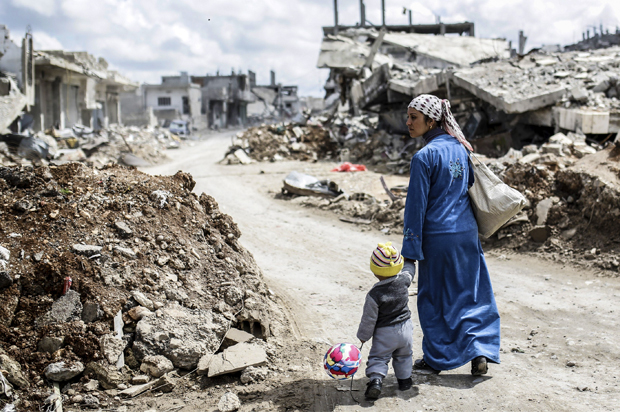Politicians and pundits from both sides of the aisle have celebrated the Trump administration’s attack on the Syrian government — yet the strike effectively helped ISIS and endangered the Syrian civilians the U.S. claimed it was protecting.
Meanwhile, the Trump administration is hinting it will continue to ramp up U.S. military intervention in Syria, and may carry out even more attacks, potentially with regime change as the goal.
On April 7, the U.S. struck the Syrian government’s Shayrat air base with 59 Tomahawk missiles. Some 20 Syrian planes were destroyed in the strike, roughly 20 percent of the government’s air power, according to the Pentagon.
Extremist rebels such as the Salafi jihadist group Ahrar al-Sham, the largest opposition militia in Syria, applauded the Trump administration’s attack, and called for more.
What is even more concerning was the impact of the U.S. strike on civilians. Syrian state media and the governor of Homs said the attack killed nine civilians, including four children, along with five soldiers. They also reported that 13 women and children were wounded in the strike, although these figures were not independently confirmed.
Los Angeles Times reporter Nabih Bulos interviewed inhabitants of the village of Shayrat, which is in central Syria, near the major city Homs. Locals said they were concerned the U.S. strike had helped ISIS. They had immediately begun fleeing, afraid the extremist group would try to take over.
“Women and children have already started to leave Shayrat to go to Homs city,” resident Mohammad Zefa told Bulos. “We’re not afraid of airstrikes. Our fear is the attack from the east,” he said, in reference to ISIS.
“Here we are loyalists to the state to the highest degree,” Zefa noted. “It’s an existential battle for us.”
He added that the Trump administration’s strike was “proof that the U.S. helps Daesh,” using the Arabic acronym for ISIS.
There were also reports that immediately after the U.S. attacked the Syrian government air base, ISIS launched an offensive near Homs.
Shayrat is one of the Syrian government’s most important air bases. It is used to carry out operations against ISIS in the east, especially in the cities of Palmyra and Deir ez-Zor. Though its capabilities were weakened by the U.S. attack, operations resumed soon after.
The Trump administration justified the strike, claiming it was in retaliation for an alleged chemical weapon attack in the al-Qaeda-dominated province of Idlib on April 3. The U.S. has not presented any evidence, and no independent international body has investigated the incident, but the U.S. and its allies accused the Syrian military of using sarin gas on Idlib residents.
The April 7 attack on Shayrat is not the first time U.S. airstrikes have effectively helped ISIS.
In September 2016, the U.S. carried out airstrikes on Syrian army forces for more than an hour, killing nearly 100 soldiers and wounding another 100. The victims had been battling ISIS near the airport at Deir ez-Zor. After the attack, which jeopardized a brand-new ceasefire, ISIS seized several strategic parts of the area.
On April 5, just two days before the Trump administration’s attack on the Syrian government, ISIS massacred 33 people near Deir ez-Zor.
Despite the numerous ways in which extremist groups benefited from the April 7 U.S. strike on Shayrat airbase, dozens of countries applauded the U.S. attack, including regimes that are hyper-repressive in their own right yet enjoy Western support. Saudi Arabia, Israel, Turkey, Qatar, the United Arab Emirates, the U.S.-backed government in war-torn Yemen, Bahrain, Canada, the United Kingdom and others endorsed the Trump administration’s offensive.
Domestically, support for the attack was almost uniform. Just six U.S. senators opposed Trump’s strike on Syria, which critics noted was likely illegal under both international and national law. A staggering 79 senators from both major parties supported it. The remaining 15 did not take a clear position.
The corporate media did its part as well. Of the 47 top U.S. newspapers that ran editorials on Trump’s attack on Syria, just one opposed it, media watchdog FAIR reported.
Arms manufacturer giant Raytheon, which makes the Tomahawk missiles the U.S. fired at the Syrian air base, saw its stocks surge after the strike.
Meanwhile, residents of Shayrat are living in damaged homes. Mohammad Zefa told L.A. Times reporter Bulos that a U.S. rocket fell just 30 yards from his home, shattering windows on his and his neighbor’s homes and cracking the walls. Zefa’s cousin Wael said part of his roof collapsed, due to the huge vibrations caused by the U.S. attack. Wael Zefa’s family immediately fled to a bunker for safety when they heard the missiles hit.
Many within the Trump administration are hinting the U.S. will carry out further attacks. White House national security adviser H.R. McMaster said the government hopes to pursue regime change in Syria. And the Russian government claimed it has intelligence that the U.S. is planning new airstrikes on the Syrian government, this time targeting the capital of Damascus.
As AlterNet previously reported, extremist groups like al-Qaeda stand to gain the most from more U.S. military intervention.


